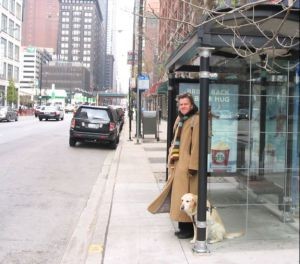Is That A Service Dog?
by Beth
 A small dog yipped and lunged at my Seeing Eye dog Whitney as we checked in for a flight at Chicago’s Midway Airport last month. No one got hurt, but it was alarming.
A small dog yipped and lunged at my Seeing Eye dog Whitney as we checked in for a flight at Chicago’s Midway Airport last month. No one got hurt, but it was alarming.
I know to ready myself for distractions from other dogs when I’m outside with Whitney, I just forget that I have to be prepared for dog distractions inside airports now, too. When we got to the gate, that same small dog barked and lunged at Whitney again. Just our luck: the yippy dog and its owner were going to be on our flight. My husband Mike was with us, and when he told me that the dog who’d lunged at Whitney was wearing a vest that said “Service dog in training,” I asked the owner the two questions federal law allows businesses to ask people claiming their dogs are service dogs: “Is that a Service Dog?” and “What tasks or work does your dog perform for you?” The owner answered “yes” to the first question, then told me the dog keeps her calm and prevents her from getting panic attacks. Another woman at the gate had a smallish dog on a leash — that dog also had a vest on that said “service dog” –and when Southwest announced that people with disabilities could pre-board, both woman rushed to the front of the line to grab the bulkhead seats.
I sat in the 8th row window seat. Whitney, a 60 pound Yellow Lab/Golden Retriever cross, sat with her bottom under the seat in front of us, her head on my feet, and didn’t make a peep during the flight. When I stood up with her after we landed, the couple who’d been sitting in the row in front of us complimented Whitney’s good behavior. “We didn’t even know there was a dog behind us!” they marveled.
“She’s a service dog,” Mike responded with a shrug. “She was trained to behave in public.” I waited for the two dogs in the bulkhead seats to leave before giving Whitney the “Forward!” command. And then? My Seeing Eye dog calmly led me off the plane.
In light of the challenges people working with service animals are facing during air travel, the U.S. Department of Transportation (DOT) is making plans to amend and clarify its regulations implementing the Air Carrier Access Act. DOT has issued an Advanced Notice of Proposed Rule Making (ANPRM) and is seeking comments from the public on these specific issues:
- Whether psychiatric service animals should be treated similarly to other service animals.
- Whether there should be a distinction between emotional support animals and other service animals.
- Whether emotional support animals should be required to travel in pet carriers for the duration of the flight.
- Whether the species of service animals and emotional support animals that airlines are required to transport should be limited.
- Whether the number of service animals/emotional support animals should be limited per passenger.
- Whether an attestation should be required from all service animal and emotional support animal users that their animal has been trained to behave in a public setting.
- Whether service animals and emotional support animals should be harnessed, leashed, or otherwise tethered.
- Whether there are safety concerns with transporting large service animals and if so, how to address them.
- Whether airlines should be prohibited from requiring a veterinary health form or immunization record from service animal users without an individualized assessment that the animal would pose a direct threat to the health or safety of others or would cause a significant disruption in the aircraft cabin.
You can submit comments by July 9, 2018 either on line, by fax, or by mail. I’m definitely going to comment – I think clearer rules about traveling with service animals could help eliminate some problems.







June 16th, 2018 at 9:41 am
I was forced to retire my last service dog early because she was attacked by “service dogs” on flex leads. She became very reactive to other dogs when she was working. A legitimate service dog handler would not dream of using a flex lead.
Psychological issues can be just as disabling as physical ones. I have no problem with emotional support dogs, provided they are properly trained to behave correctly in public. The handler must also be trained to handle it in an appropriate manner when it is working. A canine good citizen certificate should be required, but I doubt that anyone in the Elko area is qualified to conduct it.
In addition to being properly trained, the dog must also be clean. A bath the day before travel would help people with allergies to be more comfortable. I use a dog with no undercoat, which eliminates the doggy odor problem. She is an unconventional breed, and I sometimes get asked about that, but her behavior leaves no doubt in anyone’s mind that she is a legitimate service dog. She goes to rabbit shows with me and will lay quietly in a room full of rabbits, including the occasional loose one. Even some service dogs would have a problem with these conditions.
June 13th, 2018 at 12:39 pm
I believe that those who have psychological needs to have a dog with them to relieve them should be granted but with limitations. Many Pao wok abuse the law to get their pet to join them in a flight. People with severe allergies also should have a voice on it. As a severe allergy sufferer I kindly suggest that only well trained low shedding breeds should be granted that right to be in a low air circulation enclosed cabin of an airplane.